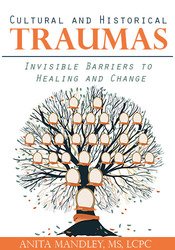Description
Cultural and historical trauma appears and is influenced in your work more than you think, especially if you work with people of colour, war survivors, refugees and their descendants. Additionally, if your clients differ from you in the areas of race, culture, religion, sexuality, class or gender, your own biases are likely to come out in session.
Watch Anita Mandley as she brings these issues out of the shadows and into consciousness, and opens a new path toward addressing the hidden grief of cultural and historical wounds. Not only will she show you how to help your client’s historical trauma, but she will help you become a culturally more mindful and competent therapist to effectively help your clients heal their trauma.
CPD
CPD
- PESI Australia, in collaboration with PESI in the USA, offers quality online continuing professional development events from the leaders in the field at a standard recognized by professional associations including psychology, social work, occupational therapy, alcohol and drug professionals, counselling and psychotherapy. On completion of the training, a Professional Development Certificate is issued after the individual has answered and submitted a quiz and course evaluation. This online program is worth 2.0 hours CPD for points calculation by your association.
Faculty
Anita Mandley, MS, LCPC, is an integrative psychotherapist practicing at The Center for Contextual Change. She’s the creator of the Integrative Trauma Recovery Group (ITR), a group therapy process designed specifically for adults with developmental and complex PTSD.
Speaker Disclosures:
Financial: Anita Mandley maintains a private practice and is a consultant with Complex Trauma, Core Energetics, and Womencare Counseling. She receives a speaking honorarium from Psychotherapy Networker and PESI, Inc. She has no relevant financial relationships with ineligible organizations.
Non-financial: Anita Mandley has no relevant non-financial relationships.
Objectives
- Evaluate the clinical implications of clients with historical trauma to inform the clinician’s choice of treatment interventions.
- Articulate clinical interventions that acknowledge and process grief and loss connected to the client’s historical trauma.
Outline
Awareness, Acknowledgement and Assessment
- Acknowledgement and Awareness of The Intergenerational Impact and Memory Traces of Cultural and
- Historical Traumas on Clients and The Therapist’s Own Self
- Relevant Areas for Assessment
- Structured Model of Assessment
- Case Examples of The Clinical Implications of Traumatic Experiences in The Present
Moving from Reflexive Reactivity to Connection, Fluidity and Coherence in The Here and Now
- Difference Between Bias, Prejudice and the “Isms”
- The Process to Regulate the Neurobiology of Bias
- The Benefit and Power of Providing the Resources of Witness, Protector and Comforter to Heal Intergenerational Wounds
How to Uncover the Survival Narrative, Validate the Trauma, And Move to A Strengths-Based Process of Empowerment and Healing
- Studying, Listening to And Validating the Client’s Traumatic Cultural Narrative, While Listening for The Resources That Helped Them Survive
- Using the Client’s Own Survival Resources, As Well As Cultural-Specific Rituals and/or Creating New Rituals for Acknowledging and Processing the Loss and Grief Connected to Historical Traumas
- New Ways to Establish Boundaries and Self-Defense and Self-Protection
Target Audience
Psychologists, Addiction Counselors, Counselors, Social Workers, Marriage & Family Therapists, Nurses, and other Behavioral Health Professionals


